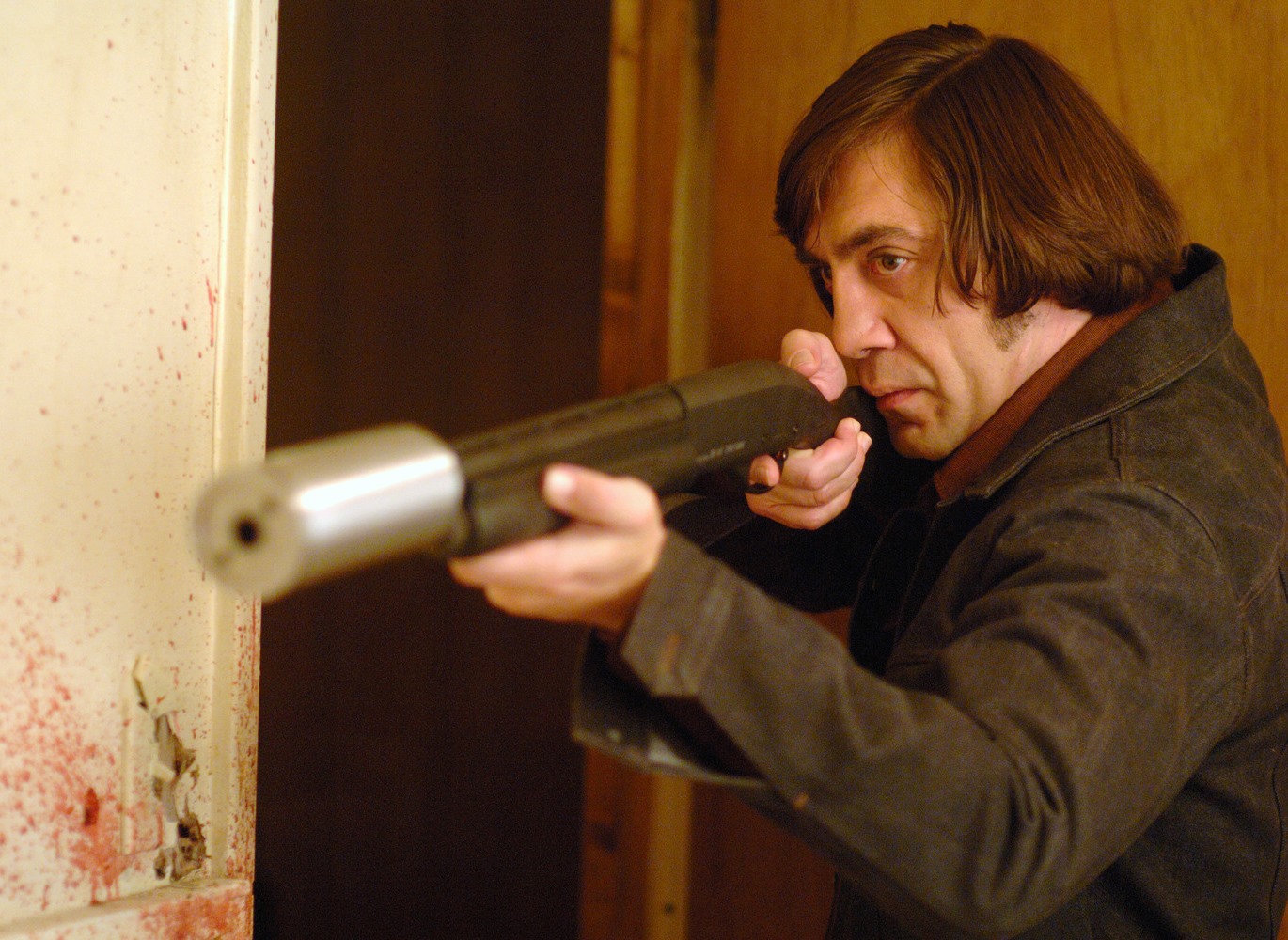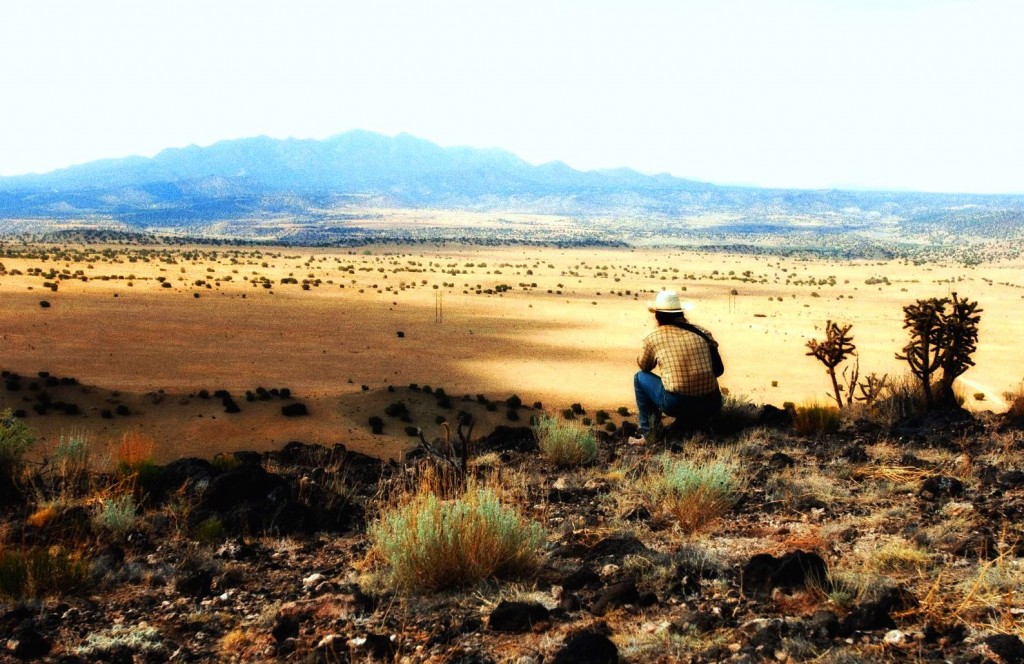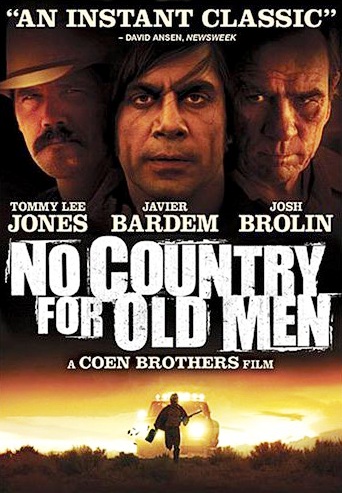
“That’s the most f—ed up ending I’ve seen since The Sopranos!” one audience member yelled at a showing that was my second viewing of the Coen Brothers film back when it came out. No Country for Old Men (2007), which I attest is a perfect film, intrigued but baffled many. This article is intended to discuss key scenes in analytical detail, and is unnecessary to read unless you’ve seen it once already and want to know more.
The following is themes and elements analysis:
• The opening voice-over – We don’t know who is talking but if you know movies well the voice is undoubtedly the voice of Tommy Lee Jones. We gather info that he’s the sheriff in one of the Texas border counties. We don’t know that he’s not going to actually appear on screen for about another thirty minutes. Jones’ Sheriff Bell tells us a story of a teen boy he once sent to the electric chair on account of his testimony. “The papers described it as a crime of passion, but he told me there weren’t nothing passionate about it. Said he’d been fixin’ to kill someone for as long as he could remember. Said if I let him out of there, he’d kill somebody again. Said he was goin’ to hell. Reckoned he’d be there in about 15 minutes.” The Sheriff now finds it is unsettling than in the new era that killers breed for the sake of terrorizing others.
• Not just about the money, he’s a serial killer – Anton Chigurh (Javier Bardem) is easily bugged by timid, ineffectual people. Chigurh is not too dissimilar a creation from a real-life serial killer like, say for instance, Ed Gein. Every situation he encounters is a potential bloodsport for him. Can he get away with it? He sizes up whatever situation he’s in and decides whether he can get away with it. The fat, bossy desk clerk at the trailer park is the one incidental character that doesn’t cower from Chigurh’s over-demanding voice. Chigurh can’t kill her, for instance, because he kind of has respect for this fat lady who doesn’t take flak from anybody.
• The coin toss game – Chigurh wasn’t going to bother with the gas station attendant at all until this fat, little man got on his nerves. I think Chigurh gets off on the excitement of “Chance.” Heads or tails the coin will call it. It’s exciting to Chigurh if he wins because then he has to execute a kill on the spot. Or perhaps fate or some transcendent power will be on the victim’s side. But why this game? Who knows. Maybe this is too much speculation but maybe in childhood Chigurh’s father would beat him or not beat him on account of a mistake, and the coin toss would decide.
• Cattle gun – Compressed air shoots a bolt that induces immediate unconsciousness in cattle, or in this case, human victims. Chigurh’s lethal weapon of choice, and we assume he’s been carrying this device around for years. Think how handy it is. A killing device as well as a door knob breaking device. And the sound doesn’t reverberate loudly like a gun. A silent weapon.
• Llewelyn Moss the sportsman – Played by Josh Brolin. When I was first introduced to his character I thought he was a policeman. Turns out he’s just a hunting sportsman who just happens to stumble upon $2 million in cash and large stashes of heroin. Not a greedy man typically, but of course, he just takes the money. Dealing heroin would be too difficult and dangerous, he thinks. Little does he realize that taking $2 million will bring endless danger.
• Return to the scene of the money – Llewelyn’s big mistake. He would have gotten away with it if he hadn’t returned. The intent? Wipe away any fingerprints at the scene. Or just give the dying hombre, i.e., drug courier some water. The hombre was really suffering. But what a mistake: Llewelyn’s heart is too big.
• Chigurh’s role with the money – Not entirely explained, but sense of it can be made. Perhaps he took a backseat job with the other Mexican goons to do the money / heroin exchange and saw it as an opportunity to steal all the loot for himself. Nah, perhaps not. Maybe he knew about this money-drugs trade from rival gangsters (the two white men he easily shoots down in cold blood). Whatever the case, Chigurh wants it all to himself and killing off opponents is the easy part.
• The Del Rio motel room 138 – Llewelyn hides the money in room 138 in the air duct. But then he checks into another room next door. Why? Because he knows somebody’s in his room 138 who shouldn’t be there. Who? He doesn’t know. But the drapes are a giveaway. Room 139 he should still be able to pull out the money out from the air duct.
• The transponder – Llewelyn finally wonders how killers are managing to successfully follow him to despite having gone incognito. The radar device is hidden in the satchel of money. Llewelyn finds this out too late as he had never bothered combing through all the bills. Chigurh finds him in a hotel that must be in a ghost town. Nobody’s awake at that time of night. No police force within the vicinity. No other person around except for the hotel night watchman who we assume was given a silent death by Chigurh. The hotel shooting leads out to the neighborhood streets. Shoot out old-west style!
• The second transponder – Rich and greedy businessman (Stephen Root) who had bankrolled this major drug transaction has the second transponder. When things tumbled out of control, the business man has to thereby hire bounty hunter Carson Wells (played by Woody Harrelson) to get the money and drugs back for him. The businessman had given the second transponder to the crew of Mexican gangsters that had found their way to the Del Rio motel earlier and into room 138. Chigurh assumed this crew has the money. Meeting / chasing down Llewelyn Moss was something of a surprise.
• Key Scene cleaning wounds – Nauseating as you watch Chigurh clean his wounds after he’s robbed the pharmacy. The Coen Brothers want you to explicitly see the gross and revolting detail. An average person, i.e., average viewer would cringe in tending cavity wounds that large. But not Chigurh. THIS IS SO IMPORTANT! Chigurh has spent a lifetime dealing with excesses in pain, and not even a car accident later on can keep him down for long. He is the human Terminator.
• The Sheriff Bell / Carla Jean Moss scene – Carla Jean is Llewelyn’s girl. Bell tells her that her man doesn’t know how deep of trouble he’s into. He tries to explain to her, in his own prism of experience, that some men (like Chigurh) are so innate to violence that anything different is inconceivable to them.
• No blood on my feet: the Chigurh / Carson Wells encounter – Carson doesn’t have a prayer. Pay attention though to a crucial detail. We saw it at the Del Rio motel where Chigurh checks his socks (he can’t stand other men’s blood on the soles of his feet). Chigurh shoots Carson Wells and then lifts his legs up on the bed so the blood won’t leak onto his favorite cowboy boots while he casually moves onto conversation on the telephone.
• Llewelyn’s new girl – In his final hours, a random flirty woman talks him into beer and probably sex. We had the impression that Llewelyn might have loved Carla Jean faithfully, but now we see how he can be talked into sex by alluring women. This is conjecture to ponder over: If he had gotten away with the money, would Carla Jean been his woman forever? If push came to shove, would Llewelyn (theoretically) risk his life to protect his woman? (Theoretically) Probably not.
• Two doorways – Close encounters between Sheriff Bell and Anton Chigurh. The Coen Brothers deliberately deceive us when Sheriff Bell enters the motel door after it has been taped off as a crime scene. But as it turns out, Chigurh’s hiding out in the room next door. If Sheriff Bell had entered it, he probably would have been a goner. As a first-time viewer, we think this is the final pay-off, the showdown scene that will settle everything. Nothing is easily settled in this film. This turns out to be not the dramatic pay-off of the movie. Why was Chigurh there? To obtain the money, of course. Which we assume he finally did.
• What happened to Carla Jean? – Chigurh made Carla Jean play the coin toss game. We’re gasping for answers as to what happens as the Coen brothers cut to a shot of Chigurh out on the front porch. Did he or didn’t he? We know he did as soon as checks the soles of his shoes to see if he got any of Carla Jean’s blood spilled on his favorite kickass cowboy boots.
• The finale car accident – Excess of pain for Chigurh, but he’s used to this sort of thing. The car accident has nothing to do with the plot… and everything to do with the plot depending on how you look at it. Look at the incident as an act of vengeance by God. If you believe in metaphysics, that every person is destined to have certain things happen to them repeatedly no matter how hard an effort there is to change, you will have a greater appreciation of what happens to Chigurh. The car accident is freakish, inexplicable, with no good reason for having happened. Eternally Chigurh will always go through a cycle of living through these types of blood-gushing events that spills blood no matter how long he lives. Spiritually he attracts violence to come his way. Eternally.
• The money tip – Following the car wreck, Chigurh gives a boy a $100 bill for his shirt. He has $2 million now, so he can afford buying people off with a C-note. Is the rest of the money in the car? No! No! Chigurh’s not dumb. Just because he eventually traveled to Carla Jean’s doesn’t mean he carries the money with him everywhere. It was probably left at whatever hotel or locker depot of his choosing.
• Genre thriller or something more potent? – At the film’s outset, we think it’s another cops-robbers-and-missing-loot thriller in the vein of “Fargo” or “A Simple Plan.” Instead we realize we’ve watched a character-driven movie where the essential antagonist is a serial killer that will never end his terror on others. With $2 million in safekeeping, that makes Chigurh the richest serial killer in the world! Imagine that. Chigurh has all the money anyone could ever wish for to live comfortably, and yet, as proven with victim Carla Jean, he will continue killing as his life’s calling. The killing of random folk will continue long after the end credits roll.
• Spiritual loss – Sheriff Bell visits an old relative. He says, “I figured when I became an older man somehow God would enter my life.” Bell is disillusioned because God never entered his life. He’s not touched with grace. He may have locked criminals away but he’s never felt like he has made the world a better place. The world has gotten worse. Old men have nothing to feel proud about. The world ain’t as pretty as it used to be, reveries of his once peaceful childhood have been chiseled away from him. The world has become downright mean and ugly.
• It’s 1980 and not 2007 – Curiously, if you see closely, such as on a newspaper date, the film is set in 1980 and not 2007. Does the date matter? It could be 1980 or 2007, but the world looks the same in those Texas towns, and arguably, the world is just as violent in either time period.
• Final Scene: Sheriff Bell discusses retirement and his dreams – Bell is retired but can he function as a retired man? His identity has been as a sheriff for so long that he can’t ever imagine doing anything else. Like Chigurh will continue killing streaks, Bell will never stop thinking about criminals or stop his desire to solve or resolve crimes. He can’t be at peace with himself. In his dream, he imagines himself a child again. A child in a peaceful world where if he was separated from his father on a campsite he could catch up with him in the dark. Once upon a time, in childhood, dark was nothing to fear. But as the world evolved into a more violent and uncertain place, Bell knows he can’t trust the dark where killers and evil lurk. Simple pleasures as a stroll in the dark with papa are vanquished. Awakened to this viewpoint, the world is now a place where old men perish and Bell knows he is bound to succumb as well. When it comes down to it, killers like Chigurh and many like him are stuck in his head. Retired, he can’t resolve any of this. I wonder after the film ends if Bell will come out of retirement and reprise his occupation. Maybe he won’t because he knows he can’t do any good anyway.
Movies are best anyways when afterwards you have other people to discuss them with. People also tend to bolt out of the exits as soon as the credits roll. Even after a second viewing, and a third and fourth, I’m still sitting there absorbing and pondering over the power “No Country for Old Men” has on me as the credits roll.






